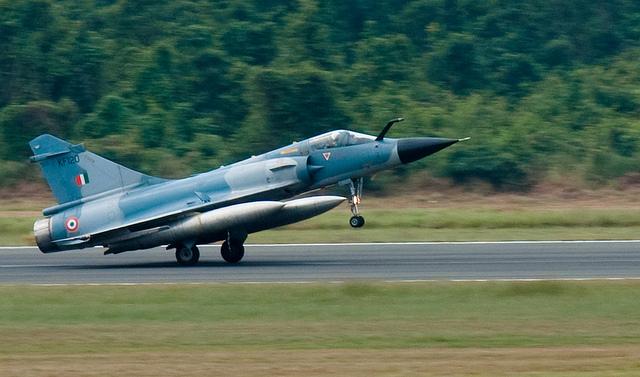India and Pakistan: inching towards war
Posted By Mohammed Ayoob on February 27, 2019 @ 15:21

In pre-dawn darkness on Tuesday, 12 Mirage 2000 fighter jets of the Indian Air Force, armed with Israeli precision guided munitions, took off from the Gwalior airbase in central India and hit the largest training camp of the Jaish-e-Mohammad [1] (JeM) terrorist organisation in Balakot deep inside Pakistan.
India claims the attack killed about 350 JeM fighters. Additional Mirage fighters that took off from different airbases in northern and central India also hit two other JeM camps within Pakistan-occupied Kashmir. All Indian aircraft returned to their bases without suffering any damage.
This operation was undertaken in retaliation for the terrorist attack [2] by a JeM suicide bomber on 14 February in Pulwama in Indian-administered Kashmir on a Central Reserve Police Forces convoy that killed over 40 personnel. The Indian army believes JeM is controlled by Pakistan’s army and spawned by that country’s military intelligence apparatus to carry out attacks in Indian-administered Kashmir. Repeated US and Indian efforts to get the UN Security Council to declare JeM’s founder, Masood Azhar, a global terrorist, have been blocked by China at Islamabad’s behest.
It was obvious from the very beginning that this time the Pakistani military brass had overreached itself and Indian retaliatory action was likely. Diplomatic and economic pressure on Pakistan was unlikely to bear fruit, since Washington is unlikely to take any action because of Pakistan’s great value to the US as the conduit to the Taliban.
The US is now in serious discussions with the Taliban in anticipation of its withdrawal from Afghanistan, and it realises that without Pakistan’s assistance it won’t be able to achieve a smooth withdrawal. These American calculations preclude any move against Islamabad at this time. China’s strategic and economic investments in Pakistan also exclude the possibility of Chinese support for any meaningful action against Islamabad.
Simultaneously, the atmosphere in India has turned highly jingoistic in the wake of the Pulwama attack, and public anger could not have been assuaged without a dramatic retaliatory measure that is seen as a forceful deterrent against future Pulwama-type attacks. Moreover, elections to India’s parliament are barely two months away and the Hindu nationalist BJP government has an obvious interest in using the Pulwama incident to its electoral advantage by a major show of military strength and political resolve vis-à-vis India’s traditional enemy.
New Delhi, in an effort to minimise provocation, has announced that its action was aimed solely at JeM bases and not at Pakistan’s military installations. But the current tense situation could easily snowball into a full-fledged confrontation if Pakistan attacks Indian military targets in Kashmir or elsewhere.
Despite the initial Pakistani reaction that played down the magnitude of the Indian attack, this remains a distinct possibility. The military is the real power behind the throne in Pakistan and cannot afford to lose face if it feels that its honor and credibility are likely to be questioned by the country’s public if it fails to respond to the Indian air attack deep within Pakistani territory.
What makes the situation dangerous is that while both countries are nuclear powers, there is a marked imbalance in their conventional military capacity that is tilted in India’s favor. If the present tit for tat results in a major shooting war, Pakistan is unlikely to withstand an Indian conventional offensive for too long.
Pakistan’s inferiority in the conventional arena is the major reason why Islamabad has refused to subscribe to the ‘no first use’ nuclear doctrine. Furthermore, unlike in India, nuclear weapons and delivery systems in Pakistan are under the control of the military top brass and the civilian government doesn’t have any say on when and how they will be used. This is a recipe for irresponsible action in times of crisis.
This projected action–reaction dynamic can easily graduate to the nuclear level if Pakistan decides to resort to tactical nuclear weapons in the event that finds itself unable to withstand India’s conventional power. Since Indian doctrine refuses to make a distinction between tactical and strategic nuclear weapons, it is difficult to predict where any escalation of the conflict would end.
This is why the Pakistani military establishment must realise that spawning and aiding terrorist groups, infiltrating terrorists into Indian Kashmir, and motivating and training local Kashmiri youth to undertake terrorist acts in the Kashmir Valley should not be taken lightly in such a tense environment.
The sooner it dawns on the GHQ in Rawalpindi that it is playing with fire that can consume the entire region, the better it will be for both countries, including the people of Kashmir whose interests Pakistan claims to hold dear.
Article printed from The Strategist: https://aspistrategist.ru
URL to article: /india-and-pakistan-inching-towards-war/
URLs in this post:
[1] Jaish-e-Mohammad: https://www.nationalsecurity.gov.au/Listedterroristorganisations/Pages/Jaish-e-Mohammad.aspx
[2] terrorist attack: https://timesofindia.indiatimes.com/india/37-crpf-jawans-martyred-in-ied-blast-in-jks-pulwama/articleshow/67992189.cms
Click here to print.